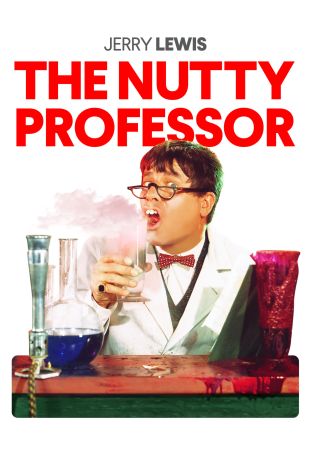It's said that every clown secretly wants to play Hamlet. For Jerry Lewis, however, playing Professor Julius Ferris Kelp in The Nutty Professor (1963), a variant take on Dr. Jekyll and Mr. Hyde, was a more than satisfactory substitute. Co-authored, directed by, and starring Lewis, the movie's reputation has suffered from the fall in its creator's reputation over the ensuing 40 years. And Lewis' portrayal of Professor Kelp, the Jekyll half of his Jekyll-and-Hyde combination, is so overtly, surreally comical, with his chipmunk-like physiognomy, that the film was thought of and sold as a kid's movie. It is a comedy about a fairly serious and complex subject, a personality that is out of balance and its owner's quest for wholeness -- it actually has much more in common with such Steve Martin vehicles as All of Me than it does with such gag-laden Lewis vehicles as Who's Minding the Store? The movie has a fascinating subtext about masculinity repressed and suppressed from the cradle that makes it one of the boldest Hollywood "comedies" of its era. The flashback scenes between Howard Morris and Elvia Allman, as Kelp's parents, are funny and surreal, but also have a tragic edge to them -- and at 88 minutes in, there's a piece of dialogue between Lewis' and Stella Stevens' characters that is so quietly poignant and so piercingly on target that it almost turns this movie, for an instant, into a tragedy. With the help of Kelp's experiments upon himself, that repressed masculinity suddenly manifests itself, transforming the introverted, intensely cerebral Kelp into the self-confident, charismatic, extrovert Buddy Love. The latter actually bears a striking resemblance to Frank Sinatra in his Rat Pack days, and, what's more, to Sinatra at his realistically obnoxious, which he could be. Where Lewis resembles Dean Martin is in the quality of his portrayal, which rivals Martin's best screen performances.
As a director, Lewis also proves a marvelous shaper of other performances -- he captures Stella Stevens, an actress whose career showed more promise than fulfillment, as an iconic figure of fresh, young, newly ripened female sexuality. Without a false note in her performance, or a wasted move or blink of an eye, she's a memorable mix of innocence, guileless lust, impetuousness, and wide-eyed wonder at the unbridled side of masculinity that she sees in Buddy Love. The shooting, editing, and scoring of the fantasy scene in which Kelp suddenly sees Stevens' character in different provocative guises recalls (and, indeed, parodies) the multi-faceted, idealized visions of Leslie Caron's character in her first on-screen appearance in Vincente Minnelli's An American in Paris. And that brings us to the music which, beyond the presence of Les Brown and his band, and Lewis' Buddy Love singing most impressively, features Walter Scharf having great fun with variations on such Paramount music library staples as Richard Rodgers' waltz "Lover" and Victor Young's "Stella by Starlight," all to very sophisticated comedic effect.

And beyond the merits of its performances and direction, The Nutty Professor functions on yet another level, its Jekyll-and-Hyde story tailored to the '60s just as they were starting to swing; between them, Julius Kelp and Buddy Love embody the struggle between two rival visions of manhood, one responsible and circumspect, and the other bold, reckless, and grasping. The movie is a loopy take on the culture war that was just coming to the fore in 1963, between established staid ideals of the previous generation and the more hedonistic extrovert sexuality embodied by the morality of the 1960s, and represented by the image of the Rat Pack and the cool "swinger" Buddy Love (one can also detect the lurking influence of Playboy magazine in Love's behavior). The movie does over-reach a bit, trying to be too many things to a few too many people, and it ends three minutes later than it should have; but The Nutty Professor is as distinctive an achievement as the best works of Charles Chaplin, Buster Keaton, or Harold Lloyd.
